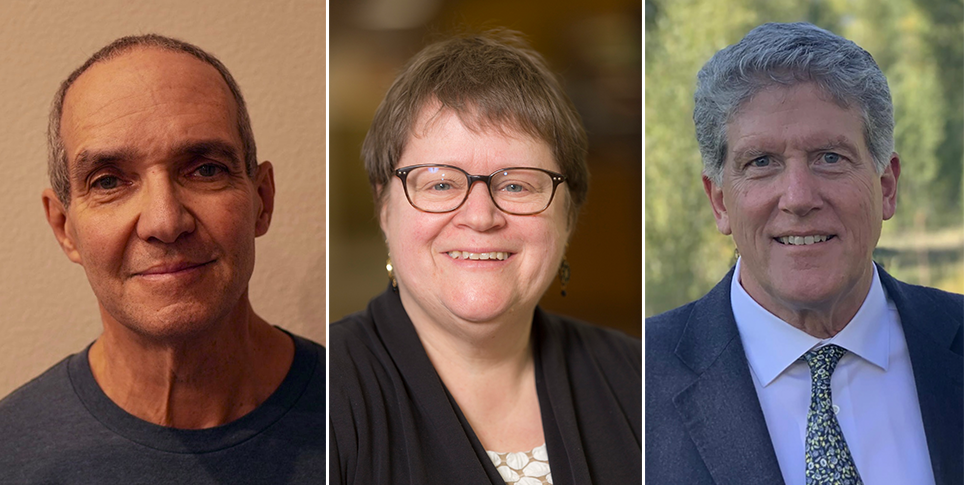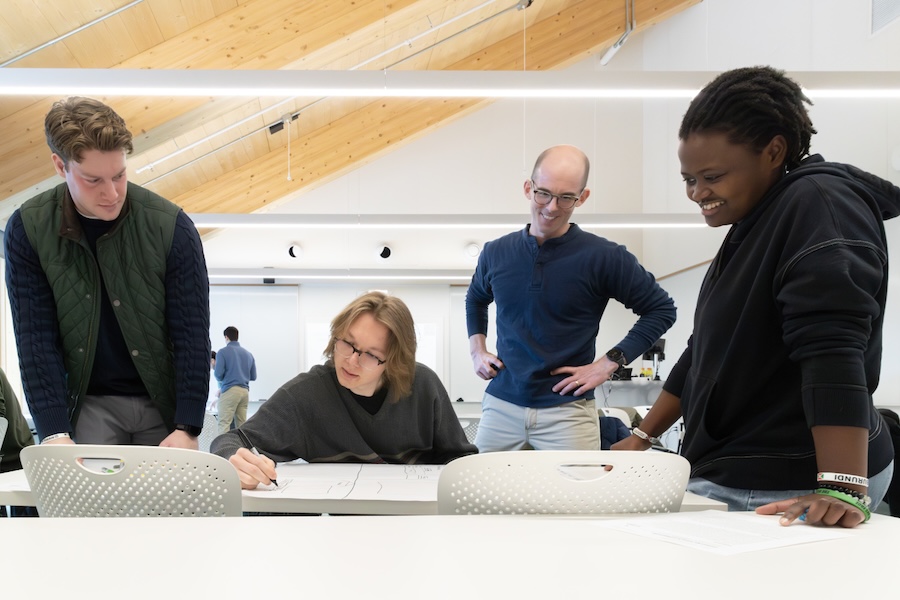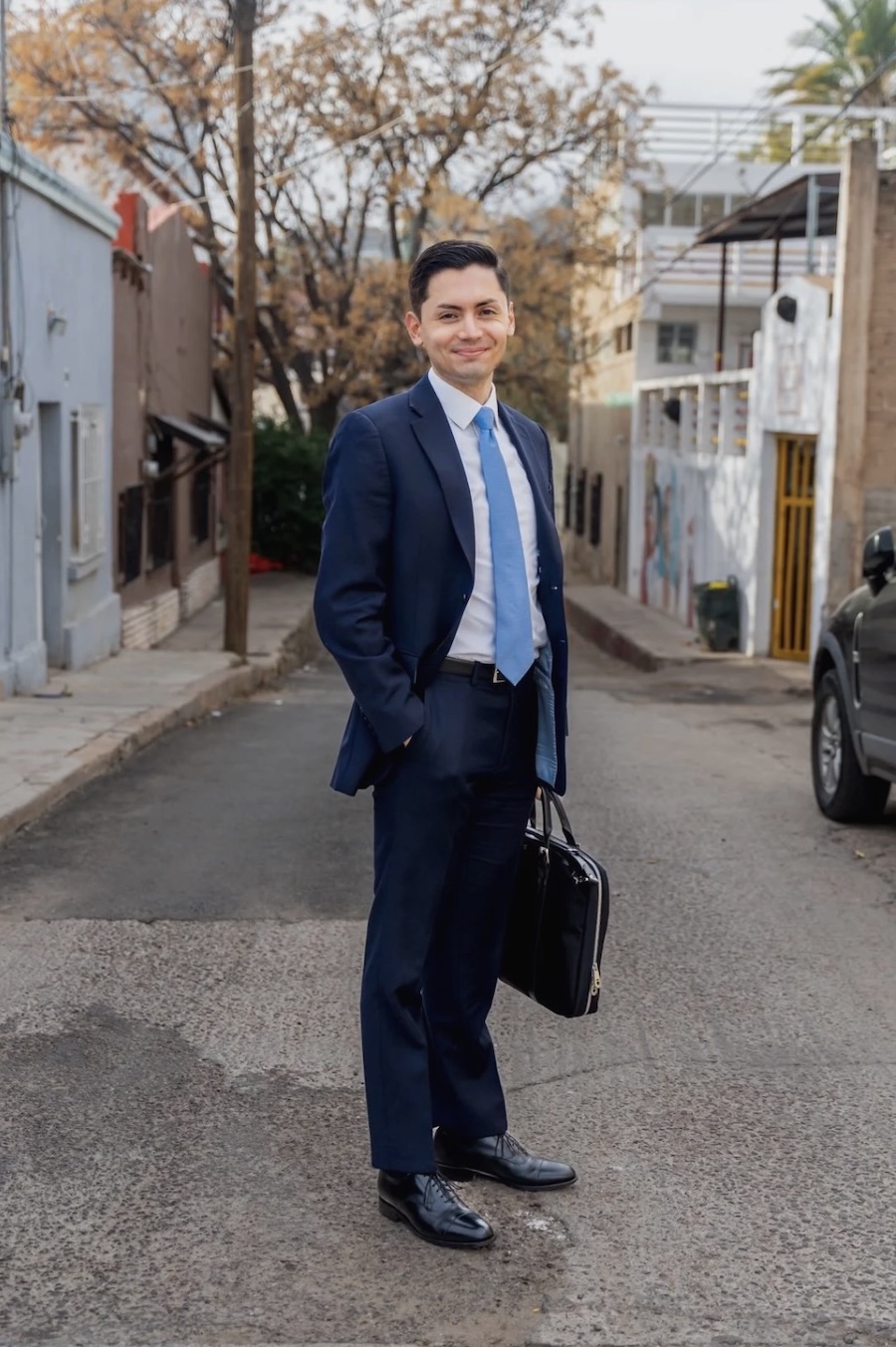Lunch with Six Supporters Address by Michel Bamani '08
By Bowdoin News
Dear trustees, alumni, students, families, friends, and supporters of Bowdoin,
It is with the utmost humility that I stand before you today to give a little speech about my Bowdoin experience and why I believe in this special place, Bowdoin. It was not that long ago that I was sitting in those chairs listening to an alum or fellow student speak about the impact that Bowdoin had on them, so it is not lost on me how fortunate I feel to speak to you all today.
When Amy contacted me to tell me that the College wanted me to speak at this event, I was both very excited but also wondered, what would I actually say? So, I consulted my family and asked them, “What should I talk about?” and my very deep-thinking seven-year-old philosopher Valentina said, “Well, Papa, why do you care about Bowdoin so much?”
So, today I will give you the answer to my seven-year-old’s question, “Why do I care about Bowdoin so much?” The short answer is simply that Bowdoin College changed my life. Bowdoin changed my life by giving me hope, the ability to dream bigger, and provided me a sense of belonging when I had lost such feeling, but it also taught me the value of being a decent human being and trying every day to just be a good person.
Professionally, Bowdoin taught me how to hope and dream bigger and also the value in asking for help.
I was born and raised in the Democratic Republic of Congo and arrived in the United States in 2000 at the age of fourteen. The reason my family and I ended up in the US is because following the Rwandan Genocide in 1994, Congo and Rwanda engaged in wars and my family was the victim of constant harassment and takings by the Congolese government because my mother was of Rwandese decent. After constant moves to avoid being found or murdered, and as my brother and I were also of the age to be taken as child soldiers, my father decided that the best thing for our family was to go to refugee camp and apply for asylum.
In the refugee camp, three countries were interviewing asylum seekers—Belgium, Canada, and the United States. Even though we spoke French and my dad was educated in Belgium and we were told that Canada had more support for refugees, my dad said we were going to apply to the United States because that was the country with the most opportunities for us kids. So, we applied for asylum to the country where we had no family, no knowledge of the language or culture. Thankfully, we were lucky enough to be accepted and resettled in 2000 to Portland, Maine. Before we left the refugee camp, my parents told all four kids, that despite not knowing the language or culture, this was an opportunity to give us a chance at a better future and safety.
From the age of eight to the age of fourteen when I arrived in the US, the circumstances of my life had made me quite a bitter and angry kid. I had seen more human deaths and atrocities than any person should have in a lifetime and had started to believe that the decks were simply stacked up against my family and me. Even when we got lucky enough to be chosen to go to America, I didn’t appreciate our luck because all I could see was my parents working two to three jobs and our inability to afford most of the things that a fourteen-year-old boy would want.
Four years after arriving to the US when it came time to apply for colleges, my high school math teacher, Mr. Beck said, “Have you ever heard of Bowdoin College?” to which I said, “No” and his response was, “Apply.” I went to the library (we didn’t have internet at home) and after researching Bowdoin I looked at the tuition and said to him that my family could not afford it and he said, “Sometimes the most expensive schools give out the most money.” You see, I was keenly aware of my family’s financial situation because my father needed my help to translate documents and he believed in being transparent with the kids, so I would sit down with him to complete his taxes or the FAFSA, and I knew that one year of tuition at Bowdoin was more than my parents made combined in a year. Per Mr. Beck’s instruction, I did apply to Bowdoin, but because I knew of the cost I was angry even when I applied to Bowdoin, but I did, mostly because I could get a waiver on the application fee.
I vividly remember opening the big envelope for my acceptance to Bowdoin (yes, at the time we received mail and an envelope for college admission), that was exciting, but the next letter is what was most exciting and important to me—I had received the John B. Russwurm scholarship, which essentially meant a full boat to attend Bowdoin. That second letter was the life-changing letter to me. If I’d gotten into Bowdoin and had to pay full price or even pay half, honestly, I wouldn’t have come because I couldn’t fathom borrowing my parents’ yearly income to come to college nor do I think they would’ve let me. That scholarship letter helped me to start regaining hope.
When I arrived at Bowdoin, I didn’t know how to ask for help or even thought I needed help. To show you how little I knew—I handwrote my first five-page assignment in a government class I took and the professor talked to me after and gave me more time to type it. I took a seminar my second semester with professor Susan Bell that I had no business being in; Professor Bell sat me down after the first assignment to essentially see if I wanted to drop the class and I told her I needed the class because I wanted to take another class sophomore year and her class was a prerequisite. She told me that she won’t give me any extra time on the assignments and they’re due on the due date, but she’ll review any draft and give me comments. For one of my final papers, I was able to give her three drafts that she reviewed before handing in the final paper on the due date. I could go on and on and on about the support that professors gave me to not only succeed at Bowdoin, but to learn how to ask for help and to put in all the hard work needed to succeed, a story I am sure many in this room can relate to—the professors made me feel like I might have not been ready on day one of Bowdoin, but I absolutely belonged here with everyone.
These myriad experiences as a student during my four years here literally changed my outlook on life. While at Bowdoin I was able to experience a world where I could hope and have people support me. A place I could ask for help when I needed it. A place where people were invested in my success. A place where people believed in me even more than I believed in myself. A place where I could dream bigger, think of a better future, and work towards achieving that future.
As an alum, I have had the countless support from so many people—I thought I loved Bowdoin then, but when I became an alum, I saw the incredible strength of the Bowdoin network. From job interviews that I have had to simply connecting with alums to figure out what I want to do with my career, to staff members that I didn’t know when I was a student but met as alum who are now dear friends (I’m looking at you Mers)—Bowdoin alums are always willing to help.
Let me just tell you a quick story about Bowdoin alums—for one of my first jobs as an attorney, I was interviewing with the head attorney at the company and he’s asking me how I liked Bowdoin and starts talking to me about how wonderful a school it is. As he’s talking, my brain is going crazy because I feel like I failed to do proper research, his bio didn’t say he went to Bowdoin, I can’t even remember a connection with him and Bowdoin; so I am trying to decipher this puzzle—does he have a child who went here, a sibling maybe? After talking about Bowdoin for a bit, I simply decided to ask him, “How are you connected to the college?” and he tells me, “Oh, my neighbor went there.” I remember thinking, “Who knows where their neighbor went to college and then on top of that can talk about that college so much, to a point where they also admire that school?!” That’s just an example of how much Bowdoin alums love this place, maybe annoyingly so.
On a personal note, Bowdoin has taught me about how to be a decent human being.
How did Bowdoin teach me to be a decent human being? It was all my classmates and the caliber of humans that come to this college. I vividly remember President Barry Mills during our first week, giving a speech and saying (I’ll paraphrase), “Look to your right and look to your left. Among this crowd will be your best friends for life.” I’ll use two specific examples of my classmates who exemplify what true decent souls are—Nik and Dudney. Recently I lost my father, who in many ways was a beacon of strength for our family and my role model. Upon hearing of this news, Nik, one of my best friends but whom I hadn’t seen for a couple years because we’d been busy with kids, work, and living in different states, simply showed up at my parents’ house with bagels. Nik and I sat down for a couple hours and just caught up and talked about everything—life, kids, work, my father, our families. His presence during that time of deep grief was probably the first time life felt normal in two or three days.
Three months later, I was at my house and a package arrived, the packaged contained two items—crystal birds and a crystal with a star in it with a note from Dudney (who had also lost his dad not too long ago). One note said “I believe that in indigenous cultures hummingbirds were messengers between the physical and spiritual world. Shoutout to dad and what he brings to both.” The other note said, “Sending love to your family as you continue to move forward together. May your little ones reach their dreams and follow the stars meant for them.” These gestures of kindness, thoughtfulness from Nik and Dudney, are just small examples of the caliber of people Bowdoin attracts and nurtures. When I arrived at Bowdoin College in 2004, I was angry—I was angry at the world and in many ways jealous for my lack of having when I could see so many people on campus who seemed to have a lot more than I did. But the kindness, generosity, and willingness to help from everyone on campus truly transformed me over those four years. I left Bowdoin a truly happy person who simply felt blessed—blessed to be surrounded by amazing teachers, happy to have so many good friends and excited for what the world will present next.
It is at Bowdoin that I learned what it means to be part of the common good, I find it is my duty to give back. To give back to my community by being involved in causes that help immigrants, to give back to my Bowdoin community by talking to current students, other alums, attending Bowdoin events, and doing everything I can to stay connected to the College and help the College, however I can, remain the special place that it is.
So, to the supporters in the room, by helping Bowdoin, you help foster the kindness of a Dudney or a Nik, you help an angry, sad student come to a place that can change their outlook on life. To the students in the room, I will say, “Look left, look right, in this very room might just be your best friend for life.”
Thank you all for listening.



